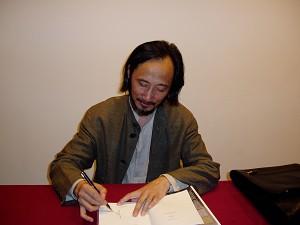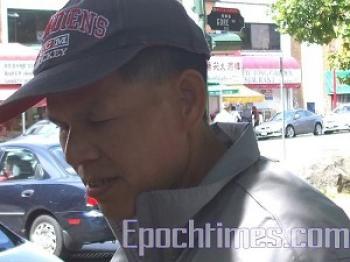A respected Chinese author has said that he expects China to become a democracy within a generation.
But writer Ma Jian stressed that the biggest obstacle to change still lay in the hearts and minds of young Chinese students, who he describes as “brainwashed” by the Communist Party’s propaganda.
The comments follow the launch of his new novel Beijing Coma, a book about a student who was put in a coma after the Tiananmen Square democracy protests in 1989, but who wakes 10 years in the future to find that people have forgotten the true events of that day.
Ma said that any future democracy in China might follow the model established in Taiwan.
He added: “Democracy is the common target for human beings. I believe that our generation will have the opportunity to see democracy in China.
“Someone said that China would be in chaos if it starts democracy. I would say that statement is insulting China.”
Ma Jian is a renowned dissident writer who fled from China in 1986 when some of his works were banned. He moved to England nine years ago, where he now lives.
Ma said that he hopes that within a year young Chinese would be able to read his novel in China. In so doing, he said, they would be able to recapture the memory of a key part of their history which has been denied them by Communist Party repression.
He added: “The major characteristics of a dictatorship is to try to wipe off the history. We must get this part of the history fixed.
“This is the main motivation of my novel. If we forgot June 4th massacre, the Chinese nation would be forever a retarded nation.”
During the massacre tanks rolled into the Square and thousands of students died under the gaze of a portrait of Mao.
In the immediate aftermath those who took part were arrested, tortured and forced to appear of state television making false confessions.
The established myth, which still lingers on to today thanks to heavy internet censorship, was that violent students killed soldiers who had been sent there to keep the peace.
John Simpson’s famous dispatch from the Square the BBC at the time has since been banned in China.
Ma said: “Why did I write a coma in this novel? It is because his body became a fortress inside which he was hiding. His hiding helped him miss everything, including being reformed, brainwashed and forced to write self-criticism statements to prove that he was wrong.
“However, in this novel, he himself was in fact alive because he had kept the memory. In terms of that memory he was the only alive one. When he woke up he found that he rejoined a society filled with dead people.”
He said that young Chinese people today oppose things simply because they are told to do so by state propaganda.
In one case he recalled a conversation he had with a Chinese student who said that he was every bit as sceptical about the news he saw on Chinese state media as that he saw on the BBC or CNN.
However the student was travelling to join the recent protests against the American broadcaster.
Ma said: “I asked him, ‘You do not believe news produced in China and have never seen CNN news but why did you go to protest against CNN?’ His reply was very simple: ‘Why should I need to know? I can oppose things that I do not know.’”
He said: “The tanks of June 4th massacre not only crushed students’ bodies, but also, even more, that they have flattened the Chinese people’s souls. The key legacy of June 4th massacre is that it has blurred the values of Chinese people. It has made everyone feel that in order to be true Chinese, his thoughts must be part of the Chinese Communist Party’s [CCP] thoughts.
“Therefore, those youths have no clear judgments based on values. You will find that if you speak to ten of them, ten of them will all talk in the similar way, following the CCP’s standards.
He added: “The current Chinese economic development has made everyone a coma. I mean that they all have lost the value or conception of morality and become comas that can only make money.
“In this novel, I want to make such a logic clear: when a society’s economy is continuously developing, if people’s souls, or kindness and morality have made no development… the more developed the distorted society is, the more dangerous it will be.”
“In my view, the true richness of a nation is its soul and not how much money it has.
“I hope those people who have faiths can bring more benefits to China. The faiths are not only a single one, Falun Gong, but also Christianity, Buddhism and Taoism which, I think, are all safer, more reliable and closer to human nature than Communism, a belief which has no faith.”



